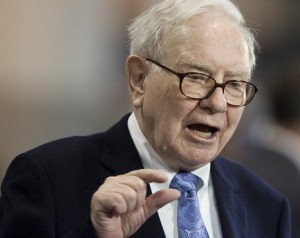Warren Buffett is legendary among investors and business leaders for starting out with a pinball machine and building that up into the world’s most successful holding company. It took Buffett decades to reach the pinnacle of his success but even when he was in his 20s he won recognition, admiration, and respect from his investors for having a special talent to identify opportunities and make maximum potential growth decisions with them.

And so today everyone wants to be Warren Buffett even though Buffett himself famously said you would do better to invest all your money in a Standard & Poor 500 index fund than to try to manage assets actively the way he does. His advice is more sound than people give credit for because Buffett understands the risks he takes. The man loses hundreds of millions of dollars on some investments but the portfolio he manages can easily absorb such huge, devastating setbacks.
The secret to Buffett’s success can be summed up as managing the risks he takes against his ability to recover quickly and move on. And the most crucial aspect of his risk management is that he uses temporary capital, “float”, to fund his investing activities as much as possible. Without float the Berkshire Hathaway financial empire would be considerably smaller than it is today. But not everyone can just go buy an insurance company to capture float the way Buffett did.
Last February Stephen Schwarzman, leader of the storied Blackstone Group, told a group of students that they should not be so quick to rush out the door and start their own agencies. Schwarzman says you need more than just a few successful deals under your belt. You also need a large network of people to work with when you want to cut new deals. Too many whizkid money brokers cut the ties with their mentors too soon, he says, thus short-circuiting their careers and denying their investors the advantages that they can build up over time by acquiring both experience and connections while working for larger firms.
Almost on the footsteps of Schwarzman’s lecture to the students Forbes has documented the troubles plaguing a “Warren Buffett wannabe”. Sardar Biglari made waves when he seized control over Steak N Shake restaurants and created a holding company that was compared to the early Berkshire Hathaway holding company. But in the several years since he started down this path Biglari has made mistakes and lost shareholder value. Is this the textbook example that proves Schwarzman’s point? Did Biglari start cutting his own deals too soon?
In addition to Steak’n’Shake Biglari Holdings also own Western Sizzlin’ restaurants and has made bids to seize control over other restaurant chains. A 2012 review of Biglari’s career up to that point made much out of the comparisons between Biglari and Buffett, but in my opinion his behavior is more like a Carl Icahn than a Warren Buffett. Icahn buys into companies that he believes can be carved up and sold off piece-by-piece in classic corporate raider style. He almost destroyed Yahoo! as a company by launching a campaign to oust former CEO and co-founder Jerry Yang. Yang walked away from a deal with Microsoft that would have made Icahn a lot of money.
Biglari is not trying to destroy companies with his investor activism. He wants to shake up old command and control structures so that he can leverage these companies into his next stage of financial wizardry. The philosophy of Biglari Holdings seems to be to find a trouble company, buy into it, disrupt the leadership, step into the newly created void, make changes, and move on. But the Biglari strategy does not always work. Like Buffett Biglari can make mistakes but Biglari doesn’t yet have the assets to cut the kinds of deals that Buffett can. In fact, Warren Buffett and Berkshire Hathaway could buy Biglari Holdings several times over.
One case study does not prove Stephen Schwarzman’s point but the Biglari story is a cautionary tale to anyone who wants to become the next Warren Buffett and investors who place their money in such a person’s hands. Whatever Biglari’s real personal ambitions may be, no one should be investing with the next Warren Buffett. You should be investing with someone whose ideals and leadership qualities you agree with. Now some of Biglari’s investors have turned upon him. You have to wonder if they were making good strategic investments or if they were investing in the next Buffett.
